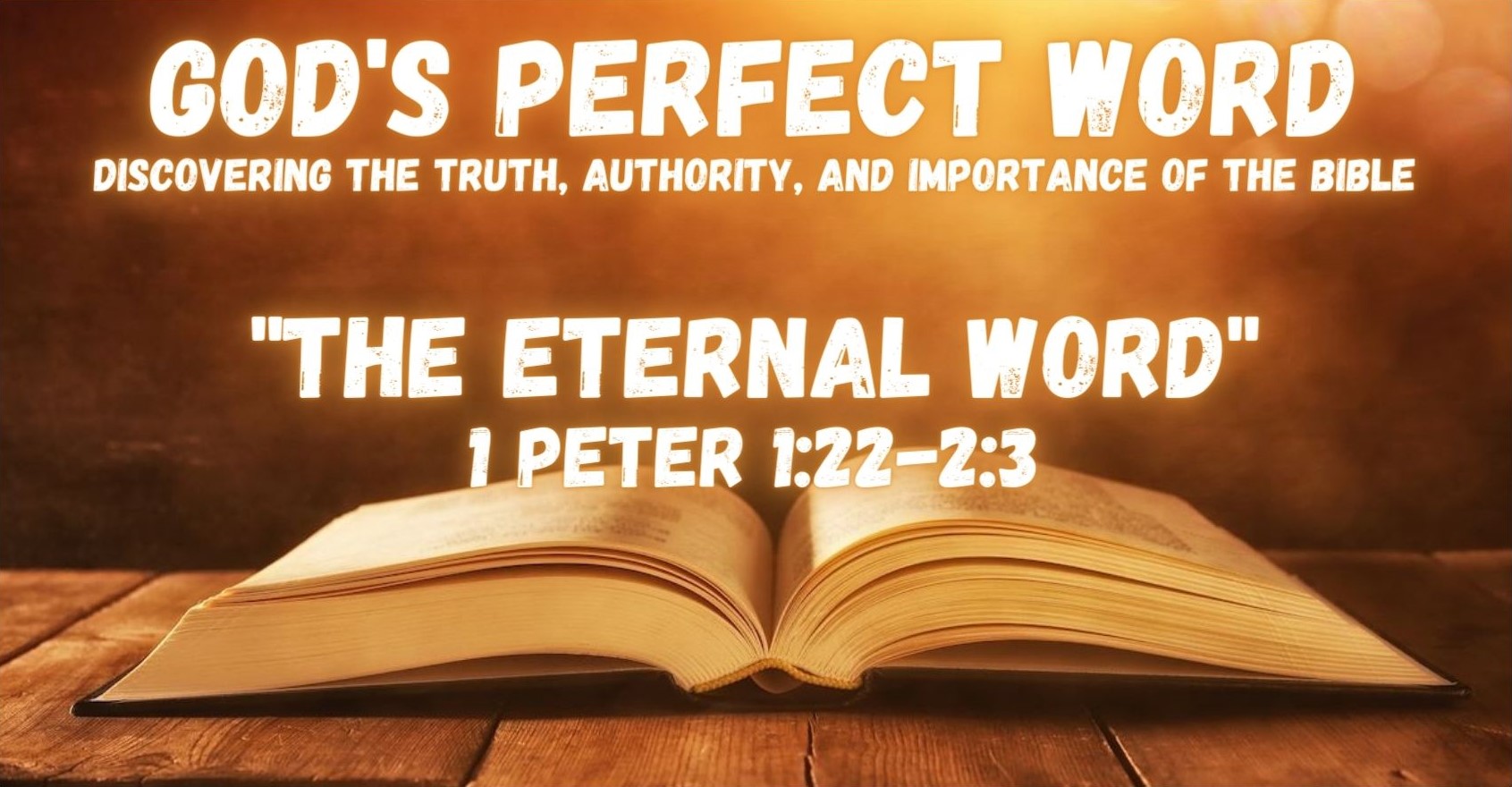1 Peter 1:22-2:3
22 Seeing ye have purified your souls in obeying the truth through the Spirit unto unfeigned love of the brethren, see that ye love one another with a pure heart fervently: 23 Being born again, not of corruptible seed, but of incorruptible, by the word of God, which liveth and abideth for ever. 24 For all flesh is as grass, and all the glory of man as the flower of grass. The grass withereth, and the flower thereof falleth away: 25 But the word of the Lord endureth for ever. And this is the word which by the gospel is preached unto you. Wherefore laying aside all malice, and all guile, and hypocrisies, and envies, and all evil speakings, 2 As newborn babes, desire the sincere milk of the word, that ye may grow thereby: 3 If so be ye have tasted that the Lord is gracious.
God is eternal. In fact, the God that is, is the only truly eternal being. He never had a beginning. All other beings, even though angels and people will live forever, had a beginning. God had no beginning. He is the eternal One. Therefore, one of the characteristics of His Word and the way He has revealed Himself is that His Word is also eternal. There will never be a time when it will not be binding because He cannot lie (Numbers 23:19; Titus 1:2; Hebrews 6:18) and He does not change (Malachi 3:6; Hebrews 13:8). There will never be a time when it does not exist because there will never be a time when He does not exist (Matthew 5:17-18).
Understanding the eternal nature of the Bible brings an amazing comfort and an amazing responsibility. Since the Word of God will never be altered or done away with, the believer can have absolute confidence and comfort in what it says as true and trustworthy. Since the Word of God will remain when the world is dissolved (Matthew 5:18), the believer’s responsibility to commit to obey and trust it should outweigh everything else.
In 1 Peter, Peter writes to Christians who are encountering various forms of persecution and trouble. He writes to them to remind them of their amazing salvation that they possess (1 Peter 1:1-12) and their responsibility to be holy (1 Peter 1:13-16) because they have been bought with the precious blood of Jesus Christ (1:17-21). Before diving into the specifics of how they are to endure various trials as Christians, he gives them one final reminder about their salvation. Their faith is not grounded in something that is shifting and untrustworthy, but it is founded in the eternal Word of God that has made them new people in Christ. As they face trials, they are to stick to the Word of God and desire it because the eternal Word that they were born again by will be their sustenance as Christians in the midst of whatever they face in life. In 1 Peter 1:22-2:3, there are three things that we can learn about the eternal nature of the Word of God.
The Word’s impact is eternal. The Word of God permanently changes things. These believers who have believed the gospel (“obeying the truth”) had now been made new creatures in Christ Jesus (1 Corinthians 5:17). This was most evident in their “unfeigned love of the brethren.” One of the great tests of saving faith is a new relationship to the people of God, the Church. The Word and the Holy Spirit in us teach us to love the body of Christ (1 John 4:7-11; John 13:34-35; Romans 5:5). It is by the Word of God that believers are born again to this new life. James calls it, “the engrafted Word, which is able to save your souls.” Paul wrote, “faith cometh by hearing and hearing by the Word of God” (Romans 10:17). The Word is like a “seed” (Matthew 13:1-23) that is either received or rejected in the heart of a hearer. To those who receive it, it brings eternal change (John 1:12).
The Word’s endurance is eternal. It will outlast everything. Peter quotes from Isaiah 40:6-8, a passage that demonstrates the eternal nature of the Word of God. Everything else may die and fade away, but God’s Word will not. This becomes important when we choose whom we will obey and whom we will fear. We can choose to fear people, who will one day pass away, or we can choose to obey God’s Word that will remain forever. We can choose to live our lives for the world or we can live our lives according to the Word and live forever (1 John 2:17). “For ever, O Lord, thy word is settled in heaven” (Psalm 119:89).
Lastly, the Word’s satisfaction is eternal. In 1 Peter 2:1-3, Peter tells the believers that they should put aside, or do away with, the things that belonged to their old lives, the things that do not come from “unfeigned love.” Instead believers are to be like infants who desire milk, the milk of the Word. Peter is not saying that desiring the Word is just for a baby Christian, but that Christians are to always be like babies desiring milk when it comes to their desire for the Word. It is because we should recognize that “Man shall not live by bread alone, but by every word that proceedeth out of the mouth of God” (Matthew 4:4). It is the means by which we will grow and endure as disciples of Jesus (John 8:31).
Do you love God’s Word? Do you love God’s people? The Word of God changes lives. Every believer is saved today because of the Word of God. May the attitude of our hearts be like the psalmist who wrote about God’s commands, “More to be desired are they than gold, yea, than much fine gold: sweeter also than honey and the honeycomb” (Psalm 19:10).






